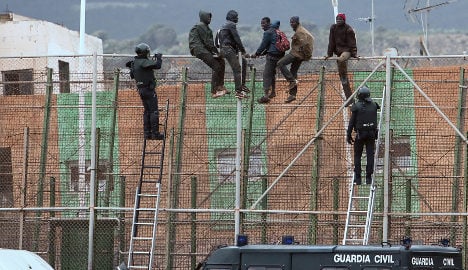The number of illegal immigrants entering Spain through Ceuta and Melilla alone increased by more than half during 2014 compared to the year before with a surge in refugees arriving from Syria.
But although the headlines have given the most attention to those attempting to cross into the enclaves by climbing the fences, the majority of those who entered Spain did so with forged documentaton presented at the border.
The total of 12,549 illegal immigrants in 2014 was a big jump from the year before when 7,472 entered Spain illegally, according to Spanish Interior Ministry information.
The new figures were given by the Interior Minister in a written response to a parliamentary question by MP Jon Inarritu of the Basque pro-independence party Amaiur.
The parliamentatrian told The Local that he had asked for the data because he believed the government was being opaque about actions at Spain's borders.
The data, published by Europa Press on Monday, showed that Syrians comprised the largest group of migrants and that about 60 percent of all those arriving in Spain entered through its north African enclaves.
In Ceuta, 1,666 people entered illegally while another 5,819 entered Melilla without permission in 2014 – up from a combined total of 4,235 people who entered both cities in 2013.
Most used false documentation to enter, according to the report.
In Melilla for example 2,861 used falsified documents while 2,069 climbed over border fences, 236 arrived on boats, 79 in vehicles and 574 through “other” methods.
Of the overall 12,549 who entered the country without permission, the biggest single nationality were Syrians who numbered 3,305 people and virtually all of them obtained entry at the Melilla and Ceuta borders using fake documentation.
Cameroon was the second-highest nationality at 1,556, followed by Algeria (1,395) and Morocco (1,183).The data has upset the parliamentarian who requested it because he believes too much is being made of Spain’s immigration problem while not enough is done for the vulnerable trying to reach here.
“It shows that Spain is one of the EU nation states that accepts the fewest number of asylum seekers,” Iñarritu told The Local.
“The PP government is always focusing on the trouble Spain has with migrants jumping the fence yet the data shows that a bigger problem exists with those entering at legal crossings with false papers,” Iñarritu said.
“There is a real problem in respect of human rights at the border. The government seems determined to blatantly ignore the criticisms from international authorities over the treatment of migrants. And it’s a disgrace for Spain.”
He also questioned why the figures released by the Interior Ministry failed to show the number of illegal immigrants who had entered through Spain’s airports.
“Historically, the vast number of those who end up as illegal immigrants to Spain come from Latin America and enter at Barajas airport, yet those figures were not released,” he said.
“So I am asking for clarification,”
An asylum expert consulted by The Local also pointed out the true illegal immigration figures could be much higher.
“It is very atypical that people go over borders, but that is what the focus is on for security,” Spanish immigration lawyer Noemí Alarcón told The Local.
“The norm is to go through the airports,” she said.
Spanish leaders called for more international cooperation in combating illegal immigration at a meeting on Monday of Euro-Mediterranean leaders in Barcelona focused on immigration and terrorism.
The country has stepped up security in the African cities in recent years, pledging €2.1 million ($2.9 million) last year to boost border enforcement between Morocco and the territories.
The conflict in Syria has been waging on for four years, resulting in about 4 million refugees, many of whom have fled to neighbouring Turkey, Iraq, Egypt and Lebanon.
Spain has been slammed for its treatment of immigrants at its borders with Morocco.
In a report last month human rights organization Amnesty International accused Spain of carrying out unlawful deportations to Morocco and the unnecessary or excessive use of force by law enforcement officials at the enclave borders.


 Please whitelist us to continue reading.
Please whitelist us to continue reading.